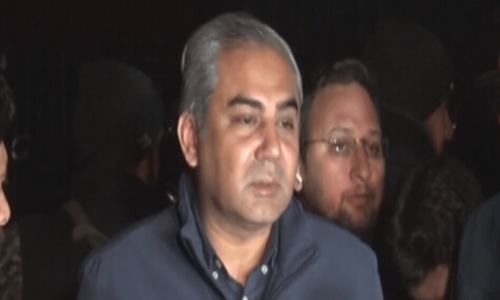KARACHI: Senate chairman Mian Raza Rabbani has said that the exploitative system in the country has created a big gap between the rich and the poor and the double standards, social contradictions and economic exploitation have destroyed society and the people have forgotten the real Pakistan in which now the majority comprises those who do not get treatment in hospitals and justice at police stations and courts.
The senate chairman made these observations while addressing a function held here on Sunday at the Arts Council of Pakistan for launching his book of short stories titled Invisible People.
He said that Pakistani oligarchy did not see harsh realities manifested in day-to-day life of people and that had compelled him to present collection of his short stories which showed the feelings and sentiments of crippled, deprived, poverty ridden and dismayed Pakistanis.
Besides the chairman, other speakers included Federal Minister Mir Hasil Khan Bizenjo, Provincial Minister Nisar Ahmad Khuhro, ACP president Mohammed Ahmad Shah, journalists Ghazi Salahuddin and Mujahid Barelvi, Professor Dr Charles Amjad-Ali, writers Zahida Hina, Naseer Memon and others.
Recalling the situation of intolerance and terrorism being confronted by people in the country, the Senate chairman termed the current situation the outcome of General Zia’s long dictatorship, which was based on destroying three main pillars of the society by use of state power which included student union, trade union, and coffee house to eliminate the sections of society who think and understand the situation and spoke about it.
He said that banning of students union and giving rightists freehand had promoted terrorism and intolerance in society and its costs were being paid by people today.
He said that he had penned his book in English because his Urdu, despite being his mother tongue was not so perfect to express his feelings.
He added that another reason was that the Urdu language was imposed as a national language despite the fact that the majority of the Pakistani people were Bengali speaking in the united country.
He said how Pakistani culture could come into being without giving recognition to different languages and cultures in federating units.
“Pakistani culture is not based on the Arab culture, but our own culture.”
He said he had mentioned in his stories real Pakistanis who did not make any news.
He said he took the cover of literature because he wanted to show the truth and reality of life.
The Senate chairman said that Karachi was the city of lights, the worker of Karachi was awakening and students of Karachi had given blood for the country.
He discussed two characters from his book — one was a worker who could not get a bed in hospital for treatment and was lying outside the hospital and her daughter was looking for doctors to provide treatment to her father. In another story he mentioned girls who were kidnapped and sold into prostitution and also mafias who forced children to begging in streets, but the oligarchy did not see them.
Mir Hasil Bizenjo said Mian Raza Rabbani was a principled politician who despite sitting in a high pedestal house thought about the poor.
Mr Khuhro said that Mr Rabbani had penned all those feelings in his book which were based on facts of life and reflected aspirations of people which no one was ready to pay attention.
Mr Ahmad Shah said that Mr Rabbani was the voice of the poor in Islamabad.
Ghazi Salahuddin termed the book a good addition to the world of literature.
Published in Dawn, March 20th, 2017












































